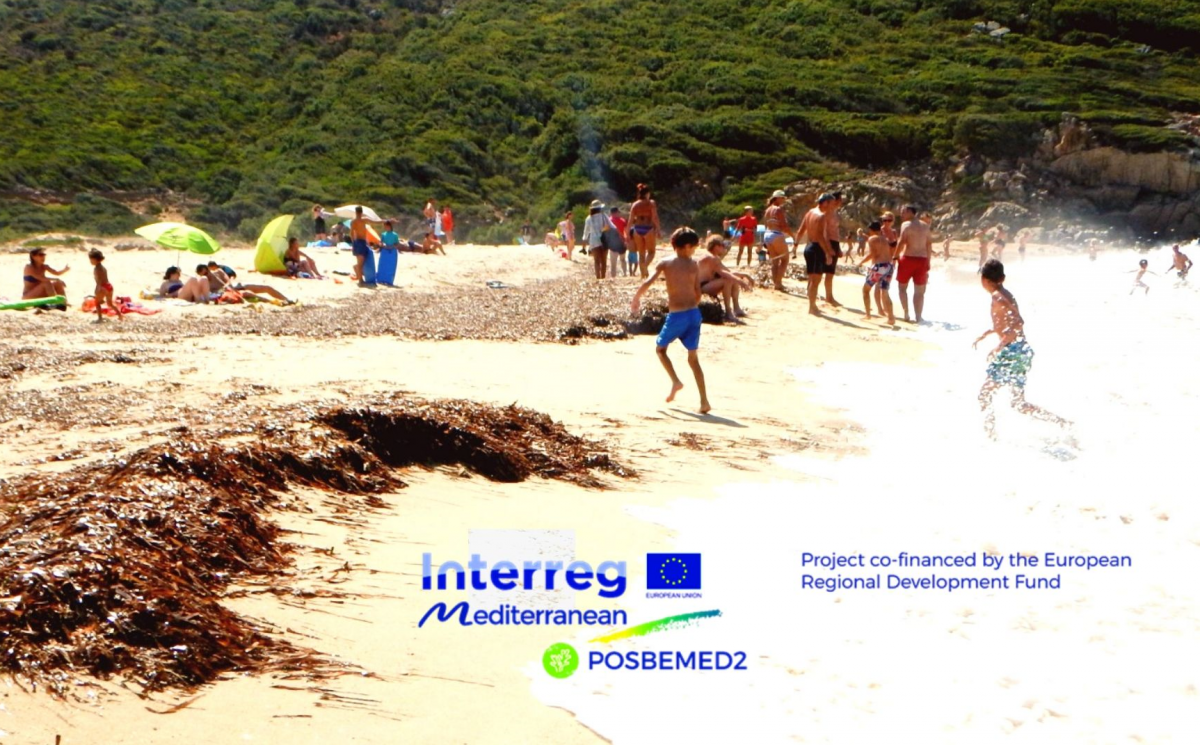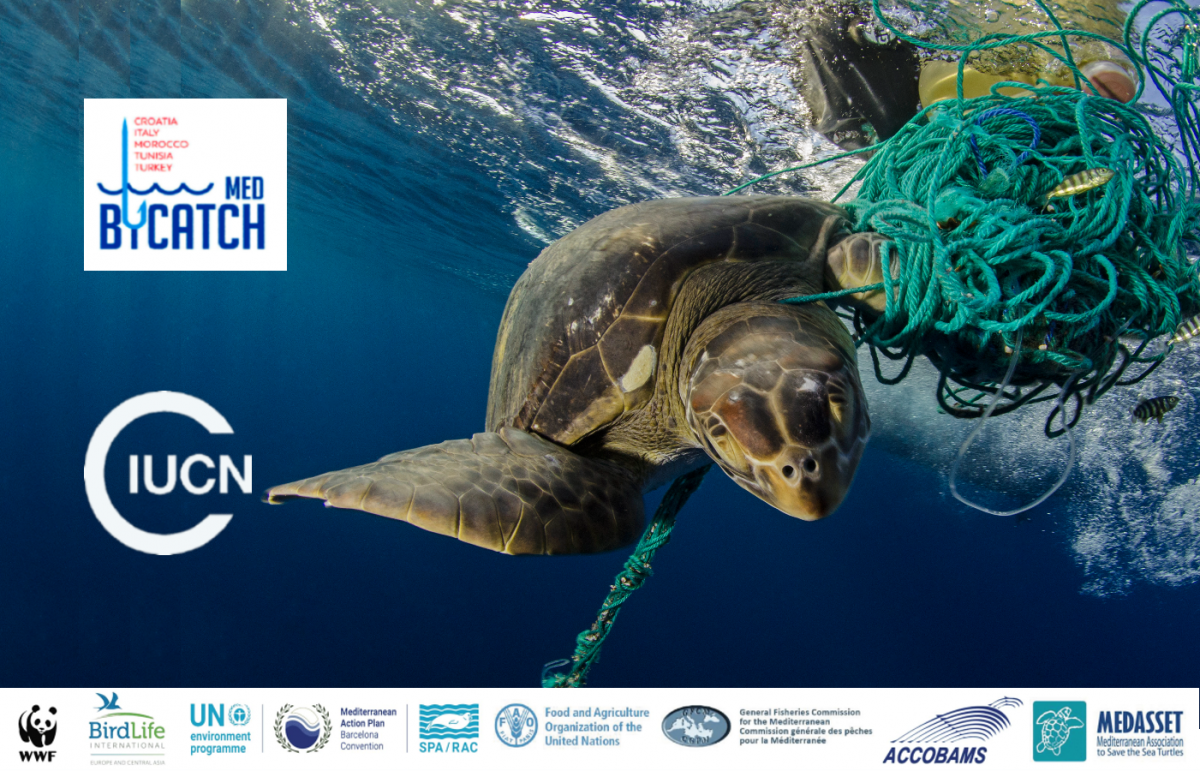POSBEMED 2 - Governance and management of Posidonia beach- dune systems across the Mediterranean
The Posidonia littoral zone (Posidonia-beach-dune system) is a valuable natural asset affected by a variety of impacts and pressures. Drifting vegetation of Posidonia forming banquettes along the beaches is a common feature of many coasts. However, residues of seagrass Posidonia oceanica beached in tourist zones represent often a problem in the Mediterranean. Surveys conducted in the previous initiative POSBEMED (2016-2018) funded by the Interreg Mediterranean programme highlighted the need to promote better management of the Posidonia littoral landscape and banquettes on beaches throughout the entire Mediterranean coast. Data gathered about beach management practices revealed that 83% of the surveyed local authorities remove seagrass deposits and banquettes every year on some or all the beaches, including protected areas.

Photo: Mar Otero IUCN-Med
Main objective
Based on the findings of the previous project, the objective of POSBEMED2 is to catalyse its results to manage the Mediterranean coastline by developing planning strategies that recognize the value of the Posidonia beach-dune environment and integrate them into the overall coastal strategy, while also addressing concerns and educating stakeholders. It further addresses key knowledge gaps, providing information that will enhance management decisions on adaptation, policies, planning and promotion in Protected Areas.
Objectives and Outcomes
The main objectives are:
- Implement a local framework for decision making for Posidonia banquettes testing different approaches and tools
- Increase awareness to build stakeholder support for more nature-oriented management strategies
- Provide better integration planning tools to be incorporated into management planning and coastal policies
The main outcomes that partners with the support of associated partners agree to deliver are:
- Integrated and transferable methodology and toolbox for Posidonia beach management in protected areas (PAs)
- Set of policy recommendations and tools for integrated management of Posidonia littoral zone in protected areas.
- Joint Charter of Commitment for Mediterranean Municipalities
- Action framework plan for Posidonia coastal zone at 8 protected areas
- Transferability of knowledge and stakeholder engagement on good practices for PA’s effectiveness enhanced.
IUCN-Med’role
The IUCN-Med will lead the technical work of the project, and also will coordinate the work-package of the testing process in 8 pilot sites to develop an action framework plan for Posidonia coastal zone in each area.
Partnership
This project is led by the Autonomous Region of Sardinia – Department of the Environment – Nature conservation and forestry policies Office (RAS, Italy), and involves 7 other partners from the Mediterranean basin: NATURA-JADERA public institution for management of protected areas in the County of Zadar (Croatia), the Institute for the Study of Anthropogenic Impact and Sustainability in the Marine Environment of the National Research Council (IAS – CNR, Italy), the IUCN Centre for Mediterranean Cooperation (IUCN-Med), the Region of Central Macedonia (RCM, Greece), the Hellenic Society for the Protection of Nature (HSPN, Greece), the Enalia Physis Environmental Research Centre (Enalia, Cyprus), the Région Sud Provence-Alpes-Côte d’Azur (France)
As associate partners:
Regional governments
Municipalities
- Municipality of L´Alfàs del Pi (Spain)
- Municipality of Altea (Spain)
- Municipalty of Denia (Spain)
- Larnaka Municipality (Cyprus)
- Municipality of Sali (Croatia)
- Autonomous Region of Sardinia – Directorate General for Local Authorities and Finance (Italy)
Tourism Agencies and Boards
- Tourist Board of Bozava (Croatia)
- Tourist board of municipality Sali (Croatia)
- Autonomous Region of Sardinia – Department of tourism, crafts and commerce (Italy)
Protected Areas Management Bodies
- National Agency of Protected Areas (Albania)
- Thermaikos Gulf Protected Areas Management Authority (Greece)
- Ministry of Agriculture, Rural Development and Environment (Cyprus)
- Office Environnement de la Corse – Service Espaces Protégés - Réserve naturelle des Bouches de Bonifacio (France)
- Management Board of Schinias-Marathon National Park, Mount Ymittos and Southeast Attica (Greece)
Other Coastal Management Bodies
- Direction Régionale de l’Environnement, de l’Aménagement et du Logement Provence-Alpes Côte d’Azur (DREAL-Région SUD)
- Public enterprise for coastal zone management of Montenegro
- Conference of Peripheral Maritime Regions (CPMR, France)
Other Interesting partners
- HOMEOTECH Co (Greece)
- Mediterranean Protected Areas Network (MedPAN)
- Foundation for Environmental Education (FEE, Denmark)
Budget
2,767,717 Euros (85% co-funded by the European Regional Development Fund)
For further enquiries, please contact María del Mar Otero



